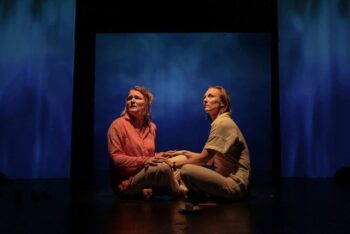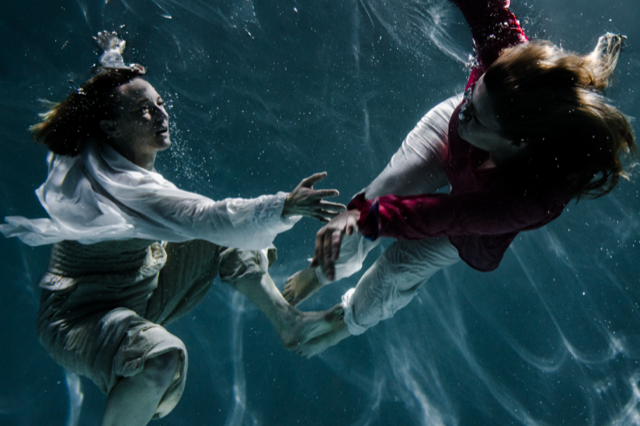Meet Me at Dawn, by Zinnie Harris, directed by Kacie Stetson, Q Theatre 20-24 February
MEET ME AT DAWN messes with your mind. In a good way. It aims to cover a lot ground in its 65 minutes, and almost succeeds.
The short play by award-winning British playwright Zinnie Harris premiered at the Traverse Theatre, Edinburgh, in August 2017, and appears onstage here in its NZ premiere.
 We begin like a Shakespearean cliché, with two characters shipwrecked on a strange shore, stranded, with all the dislocation of a strange place and dramatic arrival. The shore is stranger, we learn, than we and our characters, fully realise. The ghost of Samuel Beckett hovers.
We begin like a Shakespearean cliché, with two characters shipwrecked on a strange shore, stranded, with all the dislocation of a strange place and dramatic arrival. The shore is stranger, we learn, than we and our characters, fully realise. The ghost of Samuel Beckett hovers.
“This is a place where the rules are fucked,” says one. “A liminal place.” If you crash-land in such a place, the first three things to learn (after the adrenalin rush of survival) are ‘where am I?’, ‘how do I know?’, and ‘what do I do now?’. If our short play has three acts then those three questions describe them, with answers not all as clear as they first seem.
The play is a two-hander, so of characters in this place we have only two. (And a mysterious third whom we discover drives the story.) Sheena Irving (Woman in the House by the Sea; Blind, Bitter Happiness; Adventures of Suzy Boon) and Jesse Williams (Filthy Rich, Lonelygirl15, Upside Down) are our two survivors, lovers, explorers – scared in what they discover. Irving is especially affecting as Helen, denying what they both seem to learn.
These two earn our empathy. And then sympathy. And then our compassion. My most vivid memory of Sheena Irving was her riveting Brutus at the centre of the famous all-women Julius Caesar some moons ago. Here her tomboyish Helen searches for rescue and their way home while her lover and life-partner Robyn searches more for meaning — which lies at once far off and tantalisingly (and tragically) close. We ache for them.
Without giving too much away, I hope, we can tell the story and why it works. If I told you that we’re in a land in which the five stages of grief are told in combination with the myth of Orpheus and Eurydice …. we’ll, you’d be prepared to accept that things are strange indeed. That they need resolution. There’s a mystery to be solved, and they do, these two, and then begin to wish perhaps they hadn’t.
Grief has stages, as we painfully learn, and watch — denial, anger, bargaining etc. — grief’s final stage being acceptance, that being the key. To grief. And to much else.
They discover through this final acceptance that, as the writer Jack London once said,
“The proper function of man [and woman] is to live, not to exist. I shall not waste my days in trying to prolong them. I shall use my time.” Whatever time we have, is time enough for love.
So how to surprise in a story that’s already short, and that starts to map itself out a mite too early? Because it does surprise, and I think that’s all to the power of the acting of these two, Irving and Williams, who bring us with them convincingly on their journey through grief. (We’re invited to continue that journey after the performance by each writing the name of a lost loved one on a rock to be added to the stage set for the next night’s performance; a nice touch.)
There is a focus here that the brevity and the slim cast rewards. But brief as it is, the story still sags slightly in the middle. And if Samuel Beckett could do “nothing with nothing” and produce two full acts, could we do a little more here, I wonder? Or is this enough, with the power it has. Maybe so.
Is it affecting?
Yes it is.
Is that enough?
It probably is. More than enough.
Go and see it.
Theatre Peter
‘Meet Me at Dawn’ is on at Q Theatre until 24 February
More info and tickets here.
- Nicola Cheeseman is Back -dir. by Paul Gittins: Herald Theatre (Aotea Centre) 19 June – 7 July - June 20, 2024
- The Rime of the Ancient Mariner – Dir. by Paul Gittins: Pitt St Theatre (April 7) - April 8, 2024
- AIGA – Touch Compass Theatre, dir. by Moana Ete, Te Pou Theatre, Henderson March 20-24 - March 20, 2024

